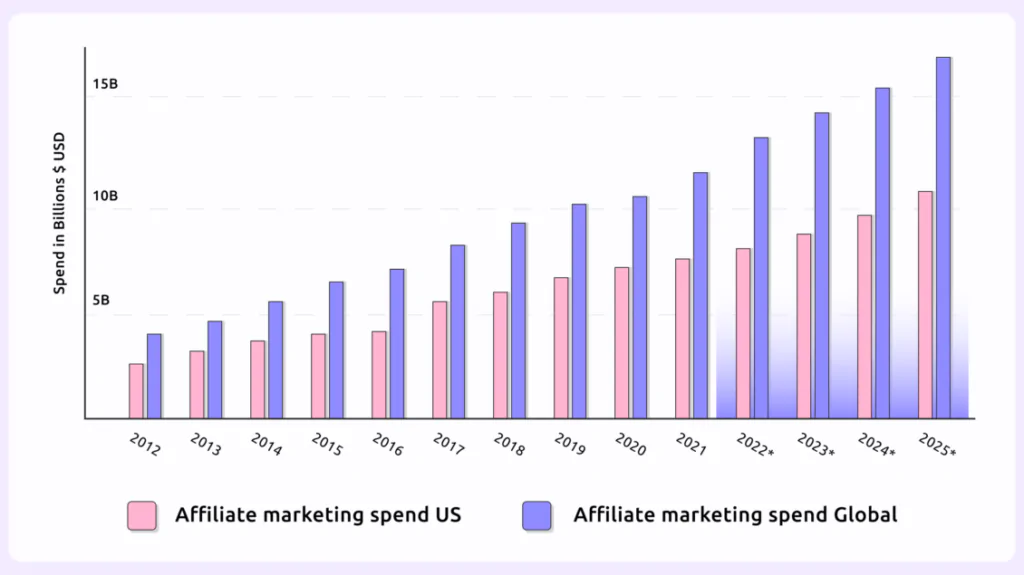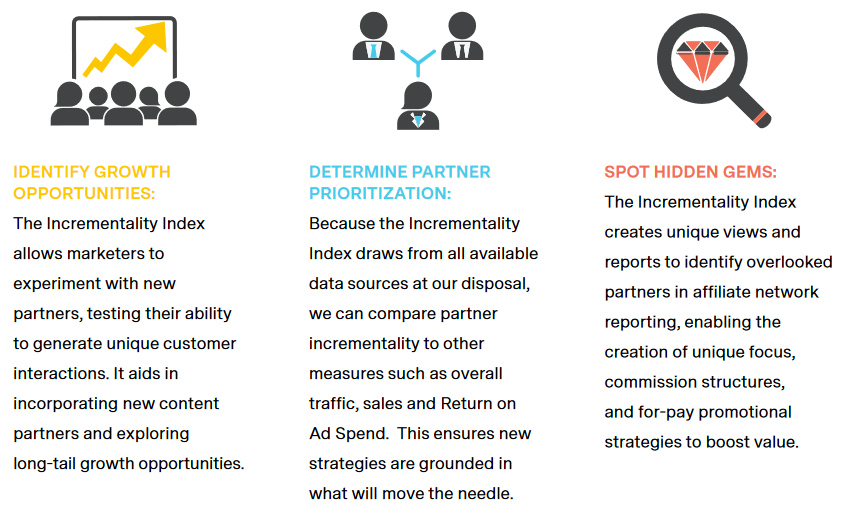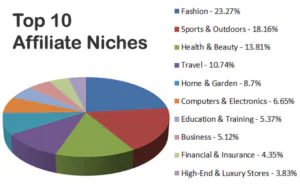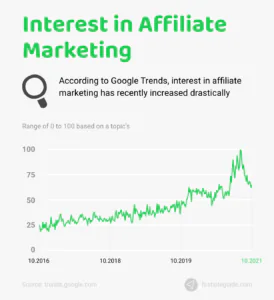Affiliate marketing trends show it has become a key component of successful digital marketing and is closely tied to business performance.
So, how are marketers using affiliates to drive better business, and which are the best strategies and channels to use in 2024?
To get the inside scoop, we consulted the experts at PartnerCentric, a leading affiliate marketing agency and industry powerhouse!
“While 90% of marketers* view influencer marketing as an effective and growing segment, vanity metrics are no longer enough to prove value. Brands will continue to rely on better data and insights to understand which partners and channels are truly driving growth–new or renewed customer segments–and incremental revenue (and) reach”
– Stephanie Harris, Founder & CEO of PartnerCentric
As you can see, there is more than meets the eye when it comes to affiliate marketing trends.
Let’s take a look at what the experts recommend!
The affiliate marketing landscape in 2024 is a dynamic and crucial component of modern marketing strategies, interweaving seamlessly with influencer marketing, content marketing, social media, and paid ad campaigns.
As of 2024, the global affiliate marketing industry is valued at over $17 billion and is expected to grow to $27.78 billion by 2027.
Affiliate marketing integration into various platforms has fueled this growth, making it a top source of income for web publishers and a crucial factor in driving brand recognition and sales.

In this environment, Instagram and TikTok affiliate marketing emerged as vital channels for affiliate marketing, with tailored programs that align with their user engagement strategies.
Along with Pinterest, these platforms are redefining how affiliate links are used and monetized, significantly contributing to the industry’s growth.
The adaptability and scalability of affiliate marketing programs make them an attractive choice for brands, leading to high returns on investment and a wide array of niche opportunities.
The Affiliate Marketing Landscape in 2024
Due to improvements in social media platforms and a shift toward more niche-focused strategies, the affiliate marketing industry in 2024 will stand as a testament to its adaptability and effectiveness in the constantly changing digital marketing landscape.
The growth of affiliate marketing and the crucial role it plays in the digital marketing landscape is clear when you look at the stats:
The implementation of data-driven strategies in affiliate marketing is transforming the industry.
It allows for better personalized and targeted marketing efforts that resonate with customers, leading to improved user experiences and higher conversion rates.
According to PartnerCentric, incrementality analysis is a key aspect of this trend. It relies on statistical techniques to isolate the true impact of different marketing efforts, guiding businesses to make informed decisions based on extensive evidence and accurate attribution rather than assumptions.
In this way, you can optimize your affiliate program to get the best results based on real data from your specific program by identifying the individual publishers and activities that are driving the most value and advancing you toward specific goals within your affiliate program.
For example, PartnerCentric’s Incrementality Index uses your marketing data to help you:

The ever-growing influence of social media platforms like Instagram, TikTok, and affiliate links on Pinterest on affiliate marketing is undeniable.
These platforms have created unique opportunities for affiliate marketers to engage with audiences through visually-driven content and influencer collaborations.
What’s more, Instagram and TikTok’s affiliate marketing programs are adapting to changing consumer behavior, where users seek authenticity and relatability.
Marketers leveraging these platforms are finding innovative ways to integrate affiliate links and promotions into their content, making them a natural part of the user experience.
PartnerCentric emphasizes using the right mix of high-quality affiliates, selected for their contextual relevance to the intention behind consumer engagement with a publisher’s content.
Content must include consumer-relevant content tailored to customer needs at various stages of the customer journey to have the most impact.
High-paying niches like education/e-learning, travel, and beauty/skincare are gaining prominence in the affiliate marketing landscape.
These niches offer significant earning potential for brands and affiliates alike due to their broad appeal and the high demand for products and services in these categories.
Marketers focusing on these niches are tapping into a growing market, capitalizing on current consumer trends and interests.
The attractiveness of these niches lies in their ability to offer specialized and tailored content to specific audience segments.
Marketers are leveraging the unique characteristics of each niche to create compelling marketing campaigns that resonate deeply with targeted demographics, driving higher engagement and conversion rates.

E-commerce platforms are increasingly incorporating affiliate marketing. This integration provides seamless opportunities for affiliates to promote products directly on these platforms.
Amazon and Shopify, for instance, offer robust affiliate programs, expanding the reach and effectiveness of affiliate marketing efforts.
By leveraging e-commerce platforms, affiliate marketers can tap into a larger customer base.
This strategy is most effective due to the built-in trust and credibility of established e-commerce platforms, leading to higher conversion rates.
Artificial intelligence (AI) is revolutionizing affiliate marketing.
AI algorithms can predict customer behavior, optimize affiliate marketing campaigns, and personalize user experiences.
What’s more, AI tools also automate many aspects of affiliate marketing, from content creation to lead generation, allowing marketers to focus on strategy and relationship building.
There is a growing focus on ethical practices and transparency. Consumer demand for trustworthiness and authenticity in marketing is what is driving this trend.
Marketers are adopting clear disclosure policies and prioritizing partnerships with reputable brands and platforms, enhancing credibility in the affiliate marketing space.
Affiliate marketing is increasingly part of cross-channel marketing strategies.
This approach integrates affiliate marketing with other digital marketing channels, creating a cohesive and comprehensive campaign.
By leveraging multiple channels, marketers can reach a broader audience and create more touchpoints, enhancing the effectiveness of their campaigns.

Mobile affiliate marketing is becoming increasingly important as the use of mobile devices grows.
Marketers are optimizing campaigns for mobile platforms, recognizing the growing trend of mobile shopping and browsing.
Mobile optimization includes creating mobile-friendly content and leveraging mobile-specific platforms and apps.
Influencer-driven affiliate marketing is becoming increasingly prominent.
Influencers across platforms like Instagram, TikTok, and YouTube are leveraging their substantial followings to promote products through affiliate programs.
This trend capitalizes on the trust and rapport influencers have with their audience. By collaborating with influencers, brands can tap into these loyal communities, leading to higher engagement and conversion rates for their affiliate marketing campaigns.
There’s a growing trend toward sustainability-focused affiliate marketing. Consumers are increasingly interested in eco-friendly and sustainable products, prompting affiliate marketers to align with brands that emphasize environmental responsibility.
This approach meets consumer demand and helps build a positive brand image. By promoting sustainable products, affiliate marketers can cater to a socially conscious audience, enhancing their campaigns’ appeal and effectiveness.
If you’re still not sure if affiliate marketing is right for your business, check out this video by ClickBank, which outlines the risks, benefits, and overall impact that affiliate marketing can have on your company so that you can make the right choice.
10 Affiliate Marketing Trends Shaping the Future of Affiliate Marketing
Instagram’s visual-centric platform is ideal for lifestyle, beauty, and fashion brands. Its affiliate marketing program benefits from high user engagement and influencer partnerships.
This channel is particularly effective for visually appealing products and brands looking to leverage storytelling through images and videos.
YouTube excels at reaching audiences seeking in-depth, detailed content. It’s a prime channel for tech brands and complex products requiring demonstrations.
Niche YouTubers can offer comprehensive reviews and tutorials, making it an excellent platform for niches that benefit from detailed explanations and visual demonstrations.
TikTok, known for its viral content and younger demographic, is ideal for brands targeting a younger audience.
The platform’s short-form video format suits catchy, creative content. It’s particularly effective for products that resonate with trends and can be showcased in entertaining, bite-sized videos.
Have a look at this video by Remotable to see how effective TikTok marketing can be for affiliates:
Podcasts are great for niche-specific marketing. They allow for in-depth discussions and can effectively reach targeted audiences, especially in specialized fields.
Brands can partner with podcasters who have a loyal, engaged listener base, making it an effective channel for products and services requiring detailed explanation or discussion.
Pinterest is a powerful tool for affiliate marketing, especially for brands in home decor, DIY, fashion, and food niches. Its visually driven content and ‘idea board’ format make it perfect for brands that benefit from visual discovery and inspiration.
Pinterest’s audience often seeks new ideas and products, making it an ideal platform for affiliates to reach potential buyers in a discovery-focused environment.
LinkedIn is an effective channel for B2B affiliate marketing and professional services. It reaches a professional audience, making it suitable for more formal or niche B2B products and services.
With its focus on professional content, LinkedIn is ideal for affiliates promoting software, educational courses, or business tools, where detailed content and industry credibility are crucial.
6 Strategic Affiliate Marketing Channels to Use in 2024
Amazon Affiliates continues to be a powerhouse, offering a large range of products across numerous categories.
This program is particularly beneficial for affiliates with diverse audiences, as it provides access to a wide array of products, from tech gadgets to home goods.
The program excels in channels like blogs, YouTube reviews, and social media platforms, where detailed product reviews and recommendations drive conversions.
Its diverse product range means affiliates from virtually any vertical can find relevant products to promote.
Shopify’s affiliate program is ideal for those in the e-commerce and business niches. It offers attractive commissions for referring new customers to its e-commerce platform.
This program is particularly successful with business influencers, e-commerce experts, and educational content creators who can authentically recommend Shopify to budding entrepreneurs and existing businesses looking to expand online.
The program benefits from detailed content on platforms like LinkedIn and specialized business blogs
The Bluehost Affiliate Program is a standout in the web hosting space. It is particularly effective for tech and web development niches, offering substantial commissions for referrals.
Affiliates like tech bloggers, web developers, and YouTube tech advisors find success with Bluehost, thanks to its reliability and reputation in the hosting industry.
The program is great for content that educates about website creation and management, making it a go-to for tech-savvy affiliates.
Each of these programs offers unique advantages, catering to different types of affiliates and audience demographics, making them stand out in the affiliate marketing landscape of 2024.
3 Super Successful Affiliate Programs Killing It in 2024
Amazon Affiliates, Shopify’s Affiliate Program, and Bluehost’s Affiliate Program are the best affiliate programs out there. Each of these programs offers unique advantages, catering to different types of affiliates and audience demographics, making them stand out in the affiliate marketing landscape of 2024.
As we wrap up our exploration of affiliate marketing trends in 2024, it’s clear that this dynamic field continues to evolve, adapting to new technologies, platforms, and consumer preferences.
The rise of data-driven strategies, the integration of affiliate marketing with popular social media platforms, and the emergence of niche-focused programs underscore a landscape that’s both diverse and rich with opportunity.
From the ever-reliable Amazon Affiliates to innovative channels like TikTok and LinkedIn, affiliate marketing in 2024 will be characterized by its adaptability and potential for growth across various industries and audience segments.
Looking ahead, the key to success in affiliate marketing lies in staying abreast of these evolving trends, leveraging the right mix of platforms and strategies, and aligning with consumer values and behaviors.
Whether through influencer-driven campaigns, a focus on sustainability, or data-driven decision-making, the future of affiliate marketing promises continued growth and innovation, offering exciting opportunities for marketers and brands alike.
Yes, affiliate marketing remains a major trend in 2024, adapting to digital innovations and consumer behaviors. This trend is bolstered by the growth of platforms like TikTok and Instagram, which have opened new avenues for affiliate marketers. To gain a deeper understanding of how these platforms are shaping affiliate marketing, and to see other key trends, check out the full article. In 2024, some of the top affiliate marketing niches include Education/E-Learning, Travel, and Beauty/Skincare, each offering unique opportunities for high earnings. These niches are particularly profitable due to their broad appeal and evolving consumer demands. Explore our detailed article to learn more about why these niches stand out and how they can benefit affiliate marketers. Affiliate marketing has experienced significant growth and evolution, with up-to-date statistics highlighting its expansion across various sectors. This growth is driven by innovative marketing strategies and the integration of affiliate marketing into diverse industries. For a comprehensive analysis of current affiliate marketing statistics and insights into its future trajectory, read our full article. In 2024, the most effective affiliate marketing channels include social media platforms like Instagram and TikTok, as well as specialized platforms suited for different niches. Each channel offers unique advantages in reaching and engaging with target audiences. To understand how to best utilize these channels and to discover other effective platforms, refer to our detailed guide.Frequently Asked Questions
Is Affiliate Marketing Trending in 2024?
What Are the Top Affiliate Marketing Niches in 2024?
How Has Affiliate Marketing Evolved in Terms of Statistics and Growth?
What Are the Best Affiliate Marketing Channels to Utilize in 2024?
AuthorityHacker: 136 Affiliate Marketing Statistics In 2024
PartnerCentric: Better Affiliate Content Marketing Starts Here
Influencer Marketing Hub: The State of Affiliate Marketing: Benchmark Report (2023)
AM Navigator: Analysis of 550 Best Affiliate Programs Reveals Top 20 Niches
Web Tribunal: 101 Affiliate Marketing Stats [Infographic] – Updated
Find Stack: The Ultimate List of Affiliate Marketing Statistics 2024
PartnerCentric: FUSE IncrementalityTM Index for Affiliate Marketing
Unite AI: 10 Best AI Tools for Affiliate Marketing (January 2024)
AI Grow: 15 Reasons Why Instagram Is Good For Marketing [2024 Guide]
*Oberlo: 10 Influencer Marketing Statistics You Need to Know in 2023